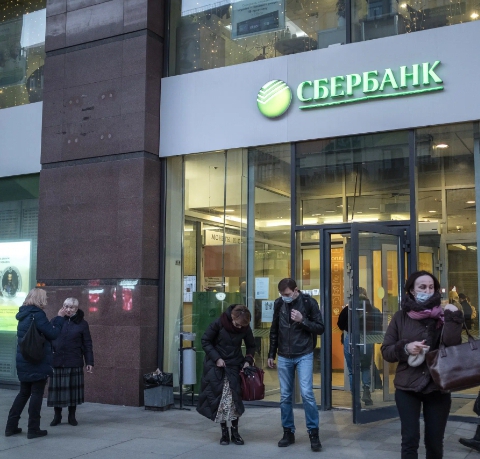The European Commission on Wednesday proposed to remove Sberbank, Russia’s biggest lender, from the international SWIFT transaction and messaging system, a move that would deepen Russia’s separation from international trade but would have limited impact on the bank’s more than 100 million clients.

While the United States banned Sberbank from processing payments through the American financial system on the day Russia invaded Ukraine, the E.U. has been much more reluctant to follow suit because of the bank’s key role in Russian energy exports and other cross-border transactions.
Now, with European Union officials signaling their readiness to introduce a phased ban of Russian oil exports, sanctioning Sberbank — Russia’s biggest financial institution — has become more politically feasible.
The ban on SWIFT transactions is not expected to have a devastating effect on the bank’s operation, however. One reason is that many Russian banks are still sanctions-free and Sberbank can structure payments through them to get around the ban, said Yevgeny Nadorshin, the chief economist at the PF Capital consulting company in Moscow. The effect of sanctions would also be mitigated because the amount of international trade and other transactions has been diminished.
“As soon as there are big players in the system that have access to SWIFT, you can organize payments that would circumvent these restrictions,” Mr. Nadorshin said in an interview. “Many sanctions are demonstrative in their impact, they make life more difficult, but not impossible.”
The E.U. also announced it would impose sanctions against two other unnamed Russian banks, though many others would still be left untouched.
After the first wave of sanctions was imposed on Russia, the country’s central bank imposed strict capital controls that prevented catastrophic bank runs and limited capital flight. Those restrictions have insulated Russia from global markets, making it harder to conduct cross-border transactions or to benefit from supply chains, but they also helped the economy remain on its feet.
Weeks after the invasion, the Russian ruble has rebounded to its prewar levels, pushing down inflation and allowing the central bank to lower the key interest rate from 20 to 14 percent and to promise further cuts this year.
Experts agree, however, that in the long run sanctions would have a negative impact on Russia’s development and modernization.
Led since 2007 by Herman Gref, a longtime associate of President Vladimir V. Putin, Sberbank was the second-most valuable bank in Europe in terms of market capitalization at the end of 2021.
Mr. Gref has transformed the lender — which traces its legacy to the gargantuan and bureaucratized Soviet savings bank — into a modern enterprise, turning branches into coffee shops and opening a whole division that became a leading producer of service robots. Mr. Gref’s ambition long-term has been to absorb many tech-oriented industries in Russia.
With its colossal capital, Sberbank has also been the key lender to Russian industrial enterprises as well as to the country’s construction sector.
Source of potential plagiarism
Plagiarism is the copying & pasting of others' work without giving credit to the original author or artist. Plagiarized posts are considered fraud.
Guide: Why and How People Abuse and Plagiarise
Fraud is discouraged by the community and may result in the account being Blacklisted.
If you believe this comment is in error, please contact us in #appeals in Discord.